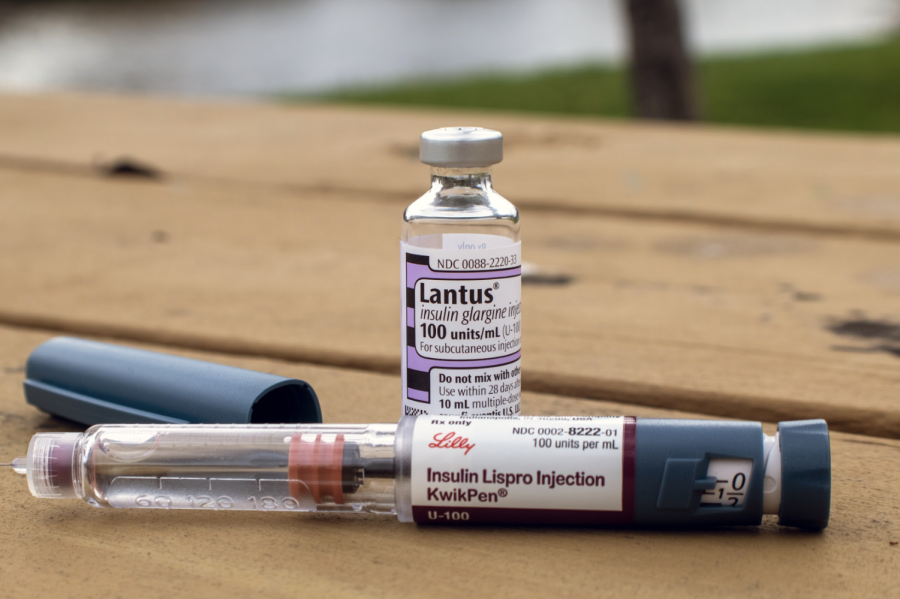Affordable Insulin Now Act Looks to Bring Cheap Insulin to Diabetics Nationwide
April 20, 2022
A bill named the Affordable Insulin Now Act recently passed through the House of Representatives with little resistance at the end of March. This bill, which awaits passage through the Senate, would limit the out-of-pocket cost of insulin to only $35 a month for those who are insured through Medicare or private insurance companies.
This bill, which was originally proposed by President Biden in his State of the Union address, would benefit a significant proportion of the 37 million Americans living with diabetes. The Affordable Insulin Now Act benefits insured diabetics, saving them hundreds or even thousands a year on out-of-pocket medical expenses.
Despite its effortless path through the House of Representatives, the bill is likely to encounter heavy resistance in an evenly split Senate, as support for the bill falls along party lines. GC Professor of Economics and Finance Cullen Wallace believes that it is unlikely the bill will pass in its original form as proposed by Senator Warnock (D-Ga.). It will require bipartisan collaboration to develop a version of the bill both parties would agree on.
“This bill is very unlikely to pass in its house form as proposed by Senator Warnock (R-Ga.). However bipartisan efforts are currently being made by Senator Collins (R-Me.) and Senator Shaheen (D-N.H.) to work on a bill that will address the insulin prices. It will be very interesting to see what they can come up with.” says Wallace.
Due to the current filibuster in the Senate, 60 votes will be needed to pass the Affordable Insulin Now Act. This hurts the bill’s chances of getting passed, unless major revisions are made, and Senator Collins can swing Republican support toward the bill.
This bill is strongly opposed, not only by Republicans, but insurance companies as well. This is largely due to the fact that the bill does not address the cost of insulin itself; it only reduces the cost of insulin to the patient. This will shift the expenses that were previously covered by individuals to health insurance companies.
Wallace speculates that insurance companies will address the new expenses placed on them by raising customer premiums, so they can maintain a similar level of profitability. He says “The actual price of insulin has not been touched. This bill will essentially force insurance companies to pay more for insulin…as a result it is expected that insurance companies will raise premiums.”
Despite the intense opposition to the bill from Republicans and the risk of its passing raising premiums for insured Americans nationwide. It appears that this bill will greatly benefit insulin dependent diabetics in a variety of ways.
According to current statistics from the Kaiser Family Foundation, the consumer price cap enacted by the bill would result in a median savings of $20 per month for the 25% of diabetics who currently pay more than $35 monthly for insulin.
Currently 25% of insulin users skip or ration insulin doses, due to the cost, which can mitigate the effectiveness of the insulin’s ability to keep a person’s blood sugar near normal levels. Reducing the cost of insulin may curb this unsafe practice.
This bill appears to have gained support from GC students who live with diabetes. “I pay $1400 each month for insulin with my insurance,” said GC junior biology major Addison Clark, who has a positive opinion of the bill “Type 1 Diabetes is one of the most expensive diseases someone can have and often forces some people to have to make a decision to either pay bills and not go hungry or to be able to buy supplies to be able to function and live a healthy life. I hope that this bill passes; it has so much potential to save lives!”
“As a Type 1 Diabetic, I definitely believe this bill will help people,” said GC senior education major Rosalyn Bosarge, who supports the bill, but also believes that it has limitations “The proposed bill caps insulin only for people with insurance, and a lot of the issue with insulin rationing is with people who are uninsured and are paying thousands of dollars for one vial of insulin. So, I think it’s great, but it definitely should extend to those without insurance as well.”
Bosarge brings up an important limitation of the Affordable Insulin Now Act. The bill does nothing to address the inflated costs of insulin for the 20% of diabetics who are uninsured. These people can still expect to pay between $330 to $1000 for monthly doses of insulin even if this legislation passes.
This bill is expected to reach the Senate agenda in the near future and will play a critical role in shaping inter party relations and cooperation in the coming months.




